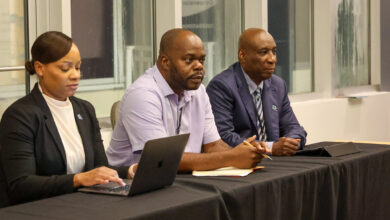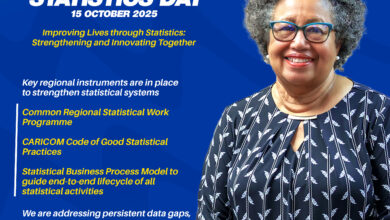World Environment Day 2008 is being observed today, 5 June, under the theme “Kick the Habit: Towards a Low Carbon Economy”. This focus is due to the fact that the world’s dependence on carbon-based energy has been one of the main factors leading to the relentless build up of greenhouse gases in the atmosphere.
This dependency has caused such a disturbance to the earth’s atmosphere that it is reportedly responsible for about 150,000 deaths per year and threatens millions with increased risks of hunger, malaria, flooding and water shortages. It has also been established in The Fourth Assessment Report of the Inter-Governmental Panel on Climate Change that if rising temperatures are to be kept within acceptable limits then societies need to significantly reduce greenhouse gas emissions.
Today, we in the Caribbean Community are trying to come to terms with the challenges posed by global climate change, sea level rise and global warming. These phenomena are causing dramatic changes in our weather and climate and threaten not only the stability of our economic and social systems but the very existence of human life.
Specifically, weather patterns have already severely affected the agricultural sector in the CARICOM Region, as it has in other parts of the world, resulting in food scarcity and rising food prices. When to this phenomenon is added the escalating cost of energy, there are serious implications for the level of poverty. In addition, altered weather patterns due to climate change factors can lead to more serious consequences from natural disasters, which are particularly daunting for small vulnerable economies such as those of the Caribbean Community. Moreover, such disasters are also likely to trigger epidemics that can have significant long term negative health implications.
Ladies and Gentlemen, it is worth reiterating that CARICOM countries are among those that contribute the least to global warming but are among the most vulnerable to its effects. So how are we responding to these challenges?
At the Meeting of the CARICOM Council for Trade and Economic Development (COTED) on the Environment in May 2008, it was agreed that a Caribbean Environment and Natural Resources Policy Framework be developed by December 2008. This framework is to serve as a mechanism for adopting creative means of building resilience and reducing our vulnerabilities to these developmental challenges.
Our Caribbean Community Climate Change Centre (CCCCC), located in Belize, is actively engaged in coordinating a Regional response to climate change and in advocating the Region’s position in the international arena including in the negotiations of the post-2012 Kyoto Agreement under the United Nations Framework Convention on Climate Change. The Centre has recently presented a draft document to CARICOM Member States to guide national consultations with all stakeholders to help the Region to address its vulnerability to climate change.
At the international level, numerous commitments have been made regarding the preservation of the environment. Among the various agreements, are the United Nations Framework Convention on Climate Change and the Kyoto Protocol, the Convention to Combat Desertification, and the Convention on Biological Diversity. The time is long past for the implementation of many of the provisions of these Conventions. We therefore need to act with haste to make them more effective in the interest and wellbeing of the population of the Region and indeed in the preservation of our planet.
As we observe World Environment Day 2008, let us conserve and preserve the great benefits that mankind has derived from the earth. It is my fervent hope that every CARICOM citizen will awaken to the fragility of our existence and take such action as he or she can to reduce our Region’s carbon footprint and preserve our environment for future generations.





